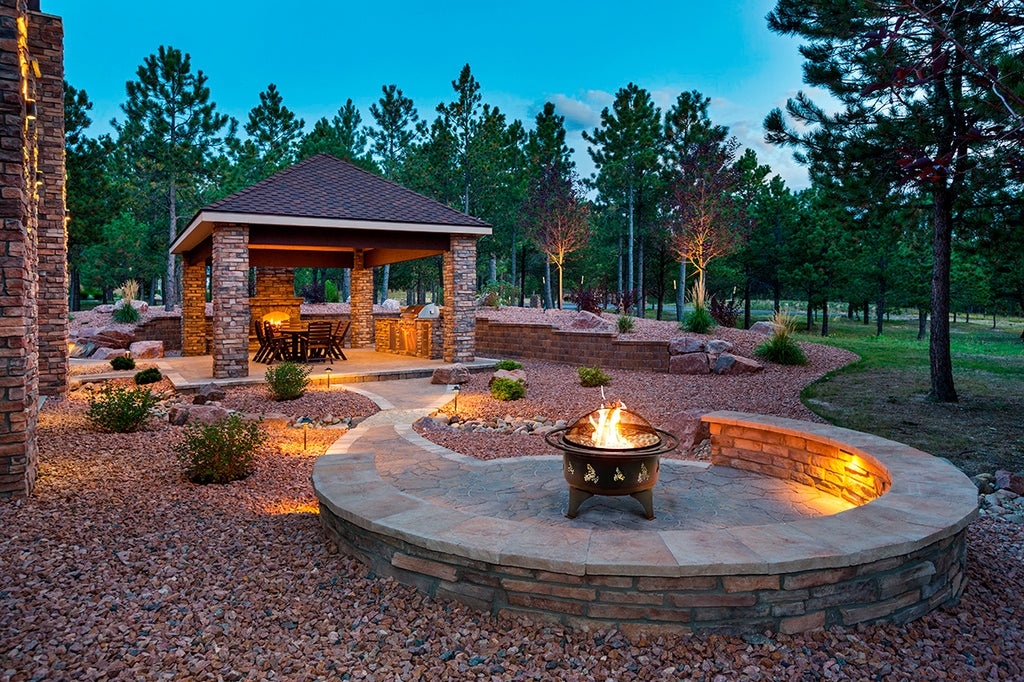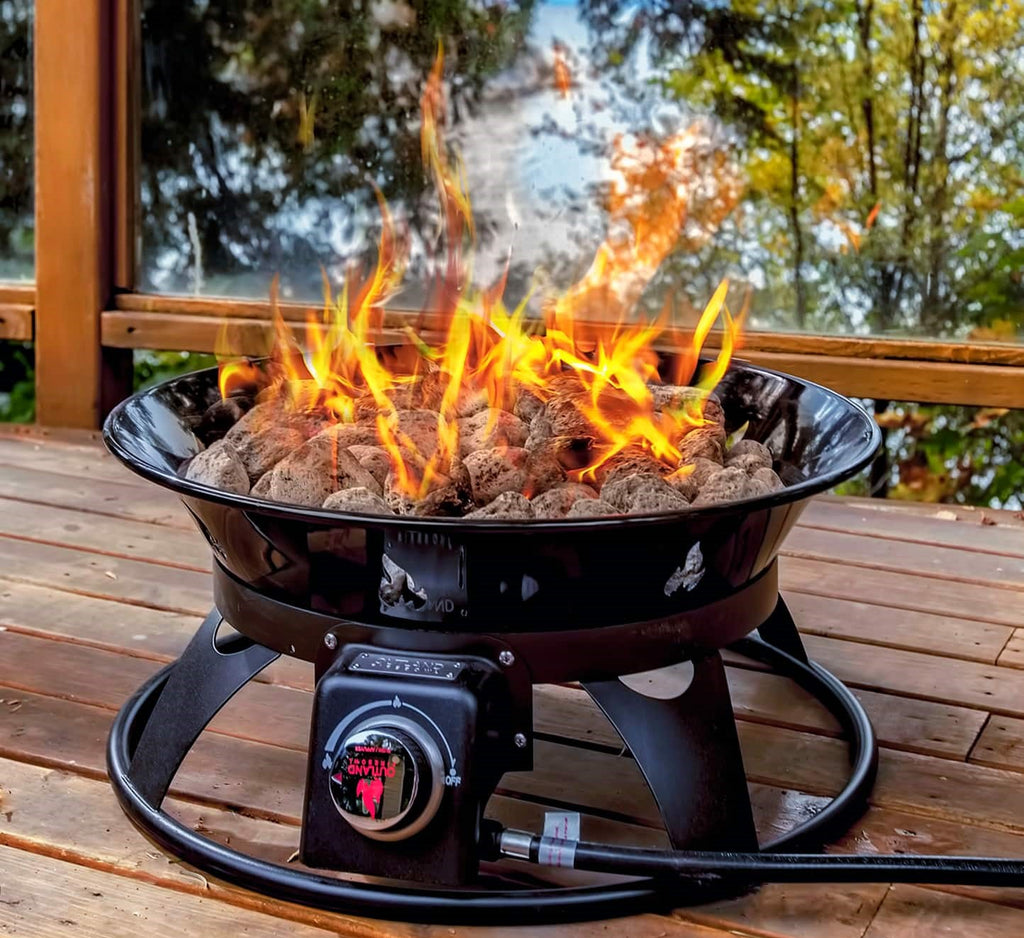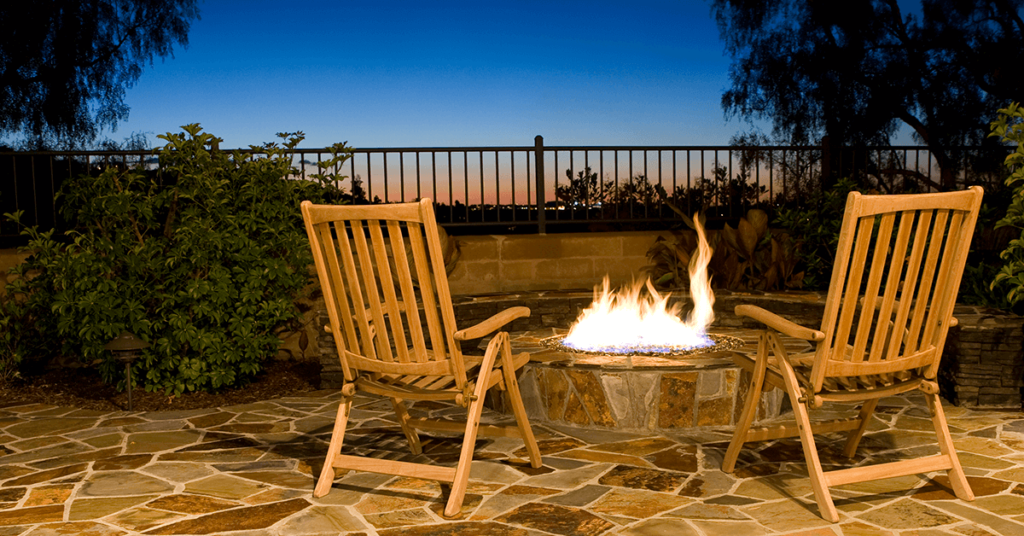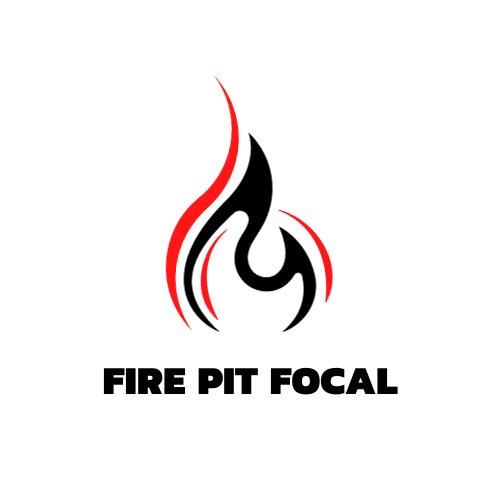Are you curious about the rules and regulations surrounding the use of propane fire pits in residential areas? Look no further for answers! In this article, we will explore whether there are any specific regulations in place for using propane fire pits in your own backyard. Stay informed and find out what you need to know to enjoy the warmth and ambiance of a propane fire pit without any legal worries.
Building Permits and Inspections
Permit Requirements
When it comes to constructing or installing propane fire pits in residential areas, it is essential to understand the permit requirements. Before starting any project, you must obtain the necessary permits from your local building authority. These permits ensure that your fire pit complies with safety and zoning regulations. The specific requirements may vary depending on your location, so it’s crucial to consult with your local building department to obtain the correct permits for your propane fire pit.
Inspection Process
Once you have obtained the necessary permits and have completed the installation of your propane fire pit, it is important to remember that inspections are a crucial part of the process. Inspections ensure that your fire pit meets all safety standards and regulations. Throughout the construction or installation process, your local building authority may schedule inspections at various stages. It is crucial to be prepared and have your fire pit ready for these inspections to ensure compliance with regulations and ensure the safety of your family and neighbors.
Location Restrictions
It is important to be aware of location restrictions when installing a propane fire pit in a residential area. Certain areas may have specific rules and regulations regarding the proximity of your fire pit to buildings or property lines. These restrictions are in place to prevent any potential hazards and ensure the safety of the surrounding structures and residents. Familiarize yourself with the local ordinances and consult with your local building authority to ensure that you comply with all location restrictions before installing your propane fire pit.
Propane Storage and Usage Regulations
Propane Tank Regulations
Propane tanks are an essential component of propane fire pits. It is crucial to understand the regulations surrounding the use and storage of propane tanks. Different jurisdictions may have specific guidelines regarding the size and placement of propane tanks. Some areas may require regular inspections or certifications for propane tanks to ensure their safe usage. Familiarize yourself with these regulations and comply with them to ensure the proper storage and usage of your propane tank.
Propane Storage Requirements
When it comes to storing propane for your fire pit, there are certain requirements that must be followed. Propane tanks should always be stored in a well-ventilated, outdoor area away from any open flames or ignition sources. It is essential to keep them in an upright position and away from any potential damage or hazards. Additionally, always ensure that the tanks are secure and protected from extreme weather conditions. Following these storage requirements will help prevent any accidents or emergencies that could arise from improper propane storage.
Distance from Structures
To ensure the safety of your property and those around you, it is crucial to maintain a safe distance between your propane fire pit and any structures. Different jurisdictions may have specific guidelines regarding the minimum distance your fire pit must be from buildings, fences, or other combustible materials. Maintaining this distance helps reduce the risk of fire or damage to structures. It is essential to adhere to these regulations to ensure the safe operation of your propane fire pit.
Propane Tank Capacity Limits
Propane tanks have capacity limits that must be adhered to. The capacity limit refers to the maximum amount of propane that can be stored within a specific tank. It is crucial to understand and comply with these limits to prevent any potential hazards or risks associated with exceeding the tank’s capacity. Exceeding the tank’s capacity can lead to issues such as leaks or explosions. Ensure that you are aware of the capacity limits of your propane tank and do not exceed them for the safety of yourself and those around you.

Fire Pit Installation Requirements
Certified Installers
When installing a propane fire pit, it is recommended to hire a certified installer. Certified installers are trained professionals who have the expertise and knowledge to safely and correctly install your fire pit. They are familiar with the regulations and guidelines specific to your area and can ensure that your fire pit is installed in compliance with these requirements. Hiring a certified installer not only saves you time and effort but also provides peace of mind, knowing that the installation is done correctly and in accordance with all necessary regulations.
Minimum Distance
One of the crucial installation requirements for propane fire pits is maintaining a minimum distance from combustible materials. The specific distance requirements may vary depending on your jurisdiction, but it commonly ranges from 10 to 20 feet. This distance helps prevent the ignition of nearby materials due to radiant heat or accidental sparks. It is vital to follow the guidelines provided by your local building authority to ensure a safe installation and operation of your fire pit.
Surface Requirements
The surface upon which your propane fire pit is installed should meet specific requirements. Typically, the surface needs to be non-combustible to minimize the risk of fire. Common examples of suitable surfaces include concrete, gravel, brick, or stone. It is important to avoid installing your fire pit on combustible surfaces such as wood decks or grass. Ensuring that the surface meets the necessary requirements will contribute to the safe operation of your fire pit and reduce the risk of accidental fires.
Ventilation and Airflow
Propane fire pits require proper ventilation and airflow to ensure safe operation. Adequate ventilation helps prevent the buildup of gas, reducing the risk of leaks or explosions. When installing a fire pit, make sure that there is sufficient airflow around the unit. Avoid placing the fire pit in enclosed or confined spaces that may impede proper ventilation. Proper airflow is crucial for the complete combustion and dissipation of gas, ensuring the safety and effectiveness of your propane fire pit.
Safety Measures and Equipment
Automatic Shutoff Valves
An essential safety feature for propane fire pits is an automatic shutoff valve. This valve is designed to automatically cut off the propane supply in the event of an emergency or abnormal operating conditions. It helps prevent leaks or gas buildup, reducing the risk of accidents or explosions. Ensure that your propane fire pit is equipped with a properly functioning automatic shutoff valve and regularly test it to ensure its effectiveness.
Fire Extinguishers
Having a fire extinguisher nearby is crucial for any propane fire pit. In the event of a fire or other emergency, a fire extinguisher can help prevent the spread of flames and mitigate potential damages. It is important to have a suitable fire extinguisher rated for flammable liquid fires, such as Class B or Class C extinguishers. Additionally, ensure that the fire extinguisher is easily accessible and in good working condition. Regularly inspect and maintain the fire extinguisher to ensure proper functionality when needed.
Fire Safety Plans
Creating a fire safety plan is highly recommended to ensure the safety of everyone in your household. This plan should include emergency procedures, such as how to respond in the event of a fire or gas leak. Identify escape routes, establish meeting points, and educate all members of the household on fire safety protocols. Regularly review and practice the fire safety plan to ensure everyone is prepared and knows what to do in case of an emergency.
Wind Guards and Protective Covers
To enhance safety and protect your propane fire pit, consider using wind guards and protective covers. Wind guards serve to prevent flames from being extinguished by strong winds, ensuring the steady operation of your fire pit. Protective covers, on the other hand, help shield the fire pit from the elements, preventing damage caused by rain, snow, or debris. Investing in wind guards and protective covers can extend the lifespan of your propane fire pit and contribute to its safe and efficient operation.

Restrictions on Usage
Noise Regulations
Some residential areas may have specific noise regulations that apply to propane fire pits. It is important to be mindful of these restrictions, especially if you plan on using your fire pit during evenings or late hours. Excessive noise can disturb your neighbors and may lead to complaints or potential legal issues. Always ensure that you comply with any noise regulations to maintain a peaceful and harmonious neighborhood environment.
Time Restrictions
In addition to noise regulations, certain residential areas may impose time restrictions on the usage of propane fire pits. These restrictions typically aim to minimize disturbances during quiet hours or during specific times of the day. Before using your fire pit, familiarize yourself with any time restrictions that apply in your area. Respecting these restrictions demonstrates consideration for your neighbors and helps maintain a positive relationship within the community.
Smoke Control
Smoke control is an important aspect of using a propane fire pit responsibly. Excessive smoke can be a nuisance to neighbors and can potentially violate local ordinances. Properly maintaining your fire pit, utilizing appropriate ventilation, and using clean-burning fuels can help minimize smoke production. Always be mindful of the amount of smoke emitted by your fire pit and take necessary measures to control it, ensuring a pleasant outdoor environment for yourself and your neighbors.
Nuisance Complaints
Responsible usage of a propane fire pit involves being mindful of any nuisance complaints that may arise from your neighbors. While you may enjoy the warmth and ambiance of your fire pit, it is essential to be considerate of others’ comfort and well-being. Excessive smoke, odor, or noise generated by your fire pit may lead to complaints from your neighbors. Address any concerns promptly and take steps to mitigate any potential nuisance. Respecting others’ rights to a peaceful neighborhood fosters a harmonious living environment for everyone.
Propane Fire Pit Maintenance
Proper Cleaning and Maintenance
Regular cleaning and maintenance are crucial for the safe and efficient operation of your propane fire pit. Follow the manufacturer’s instructions for cleaning and maintenance, including periodic inspections and servicing. Remove any debris, ash, or residue from the fire pit and ensure that the burner and gas lines are free from any obstructions. Proper cleaning and maintenance help prevent malfunctions, gas leaks, and ensure the longevity of your fire pit.
Regular Inspection and Testing
Regular inspections and testing play a vital role in the upkeep of your propane fire pit. Inspect the entire fire pit, including the gas lines and connections, for any signs of wear, damage, or leaks. Test the automatic shutoff valve and ensure that it functions correctly. It is recommended to have a professional inspection conducted annually to identify any potential issues and address them promptly. Prioritizing regular inspections and testing contributes to the safety and performance of your propane fire pit.
Replacing Worn-out Parts
Over time, certain components of your propane fire pit may become worn out or damaged. It is crucial to identify and replace these parts promptly to maintain the safe operation of your fire pit. Faulty components can lead to leaks or malfunctions, posing potential hazards. Keep an eye on the condition of the gas lines, burner, ignition system, and other essential parts of your fire pit. If any parts show signs of wear or damage, consult the manufacturer or a professional for replacement.
Gas Leak Detection
Gas leaks are a serious safety concern when it comes to propane fire pits. Periodically check for gas leaks using a mixture of liquid soap and water. Apply the solution to the gas connections and observe for any bubbles. If you notice bubbles forming, it indicates a gas leak, and immediate action should be taken. Turn off the gas supply, ventilate the area, and contact a professional to address the issue. Regular gas leak detection helps ensure the safety of your fire pit and minimizes the risk of accidents.

Environmental Regulations
Air Quality Standards
Propane fire pits, like any other forms of combustion, can impact air quality. To safeguard the environment and public health, certain jurisdictions may have air quality standards in place. These standards aim to control emissions from various sources, including propane fire pits. It is crucial to be aware of these standards and operate your fire pit in a manner that minimizes air pollution. This may include using cleaner-burning fuels or following specific guidelines provided by your local environmental agency.
Emission Regulations
Related to air quality standards, emission regulations specifically address the amount of pollutants released into the atmosphere. These regulations may restrict the types of fuels or equipment that can be used, or set limits on the emissions allowed from propane fire pits. Adhering to emission regulations helps reduce the environmental impact of your fire pit and ensures compliance with local laws. Stay informed about the specific regulations applicable in your area and make conscious choices to minimize emissions.
Environmental Impact Assessments
In some cases, environmental impact assessments may be required before installing a propane fire pit. These assessments evaluate the potential effects of a project on the environment and help determine if any mitigating measures are necessary. The assessments may consider factors such as air quality, noise levels, or impact on natural habitats. If an environmental impact assessment is required, it is crucial to follow the guidelines provided and obtain the necessary permits before proceeding with the installation.
Insurance and Liability
Homeowner’s Insurance Coverage
Before installing a propane fire pit, it is important to review your homeowner’s insurance policy to understand the coverage provided. While policies can vary, many insurance providers cover fire pits, including propane fire pits, under their standard homeowner’s insurance policies. However, it is advisable to confirm this coverage with your insurance provider and address any specific requirements they may have. Providing your insurance provider with accurate information regarding the installation and usage of your fire pit will help ensure proper coverage in case of any unforeseen events.
Liability Coverage
Liability coverage is an essential component of your homeowner’s insurance policy. It protects you financially in the event that someone is injured or their property is damaged due to the operation or presence of your propane fire pit. It is crucial to review the liability coverage provided by your insurance policy and verify if any additional coverage is necessary to adequately protect yourself and your assets. Consult with your insurance provider to determine the appropriate liability coverage based on your specific circumstances and the regulations in your area.
Additional Insurer Requirements
While homeowner’s insurance policies generally provide coverage for fire pits, including propane fire pits, there may be specific requirements or conditions set by the insurer. These requirements may include the installation of certain safety features, adherence to local regulations, or regular maintenance and inspections. It is important to understand and comply with any additional insurer requirements to ensure that your fire pit is eligible for coverage and to avoid any unexpected issues with your insurance provider.

Local Ordinances and HOA Rules
Municipal Ordinances
In addition to any state or provincial regulations, residential areas are often subject to local municipal ordinances. These ordinances are specific to your city, town, or municipality and may include regulations regarding the installation, usage, or maintenance of propane fire pits. It is crucial to be aware of these ordinances and comply with them to avoid any penalties or legal issues. Contact your local government or visit their website to familiarize yourself with the municipal ordinances that apply to your area.
Homeowners’ Association (HOA) Regulations
If you live in a neighborhood governed by a homeowners’ association (HOA), it is important to consider their rules and regulations regarding propane fire pits. HOAs often have specific guidelines in place to ensure a consistent aesthetic and maintain the safety and well-being of the community. Consult your HOA’s rules and regulations or contact their management to determine any specific requirements or restrictions regarding the installation or usage of propane fire pits.
Permitting and Documentation
Local ordinances or HOA rules may require specific permits or documentation for the installation of a propane fire pit. These permits and documentation ensure that you have met the necessary requirements and obtained the appropriate approvals before proceeding with your installation. Failure to obtain the required permits or documentation may lead to penalties or the need to remove the fire pit altogether. Be proactive in researching the permitting process and gather all necessary documentation to ensure a smooth and compliant installation.
Enforcement and Penalties
Enforcement Agencies
To ensure compliance with regulations, enforcement agencies are responsible for monitoring and enforcing the rules and restrictions related to propane fire pits. These agencies can include fire departments, building departments, or other local authorities. It is important to respect and cooperate with these agencies to maintain a safe and compliant environment. If you have any questions or concerns about the enforcement of regulations, reach out to the appropriate agency for guidance and clarification.
Violations and Penalties
Violations of regulations and ordinances related to propane fire pits may result in penalties or fines. The specific penalties can vary depending on the severity of the violation and the regulations in your area. Common violations include failure to obtain the necessary permits, installation or usage in prohibited areas, or non-compliance with safety requirements. To avoid potential penalties and legal issues, ensure that you are well-informed about the regulations and follow them diligently.
Appeals Process
If you believe that a violation notice or penalty is unjust or incorrect, you may have the option to appeal the decision. The appeals process typically involves providing evidence or documentation to support your case and appearing before a hearing or review board. It is crucial to understand the specific appeals process outlined by your local jurisdiction and follow it accordingly. Consult with the appropriate authorities for guidance on how to proceed with an appeal and present your case effectively.
In conclusion, regulations surrounding the use of propane fire pits in residential areas aim to ensure the safety of individuals and protect the environment. It is essential to familiarize yourself with these regulations, obtain the necessary permits, and comply with all applicable requirements. By adhering to these regulations, maintaining proper safety measures, and being considerate of your neighbors, you can enjoy the warmth and ambiance of your propane fire pit responsibly and harmoniously within your community.



